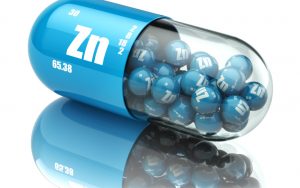- Home
- Editorial
- News
- Practice Guidelines
- Anesthesiology Guidelines
- Cancer Guidelines
- Cardiac Sciences Guidelines
- Critical Care Guidelines
- Dentistry Guidelines
- Dermatology Guidelines
- Diabetes and Endo Guidelines
- Diagnostics Guidelines
- ENT Guidelines
- Featured Practice Guidelines
- Gastroenterology Guidelines
- Geriatrics Guidelines
- Medicine Guidelines
- Nephrology Guidelines
- Neurosciences Guidelines
- Obs and Gynae Guidelines
- Ophthalmology Guidelines
- Orthopaedics Guidelines
- Paediatrics Guidelines
- Psychiatry Guidelines
- Pulmonology Guidelines
- Radiology Guidelines
- Surgery Guidelines
- Urology Guidelines
Zinc supplementation suppresses fat deposition in liver, find IIT Mandi researchers

Zinc supplementation suppresses fat deposition in the liver. Moreover, its nanoparticles mediate the signalling pathways to induce insulin sensitivity and may potentially prevent Non-Alcoholic Fatty Liver Disease.
MANDI: A research team led by Dr. Prosenjit Mondal, Assistant Professor, School of Basic Sciences, Indian Institute of Technology Mandi, and Dr. Debabrata Ghosh from CSIR-Indian Institute of Toxicology Research (CSIR-IITR), Lucknow, has recently shown that zinc oxide nanoparticles can prevent fat accumulation in the liver and thereby prevent Non-Alcoholic Fatty Liver Disease (NAFLD). Their work has recently been published in the journal, Nanomedicine: Nanotechnology, Biology, and Medicine.
Liver, the largest internal human organ, secretes bile, stores glucose in the form of glycogen, and converts vitamins, minerals, and amino acids into their biologically absorbable forms. While hepatitis viral infections and alcohol-induced liver malfunctions used to be the main cause of liver diseases in the past, the dramatic shift towards sedentary lifestyles and unhealthy food habits has caused them to be outpaced by Non-Alcoholic Fatty Liver Disease or NAFLD. “NAFLD is a condition in which the body creates too much fat that gets stored in the liver cells, called steatosis, which could lead to scarring or cirrhosis, and eventual liver failure”, says Dr. Prosenjit Mondal. WHO reports that the number of deaths due to liver diseases in India was 259,749 in 2017. Nearly 120 million Indians are estimated to suffer from NAFLD, with a higher incidence rate amongst obese and diabetic people.
“Insulin resistance is one of the hallmarks of NAFLD”, the researchers write in their article. In addition to converting blood glucose into storable forms such as glycogen, insulin also induces lipid generation from non-fat sources, a process called lipogenesis. A complex array of cellular factors and enzymes regulate lipogenesis. When this signaling becomes faulty, due to bad lifestyle and/or genetic predisposition, insulin function is impaired and there is excess lipogenesis, resulting in increased fat accumulation in the liver.
The research team has shown using cell and mice models that zinc supplementations either in the form of nanoparticles or salts are effective in reducing fat accumulation in the liver and inducing peripheral insulin sensitivity. The researchers first treated human hepatocellular carcinoma cells with zinc oxide nanoparticles and tested the lipid accumulation in the cells in comparison to untreated cells. They also injected the nanoparticles into the bodies of mice fed with fatty diet and monitored cell signaling, gene expression and also assessed the cellular energy levels. The mice were also subjected to glucose tolerance tests to assess insulin function and compared with mice fed with normal diet and fat-fed mice not treated with the nanoparticles.
In the cell tests, the researchers found that the presence of zinc oxide nanoparticles prevented the accumulation of fat in them. In the mice models, they found that the zinc supplements prevented the cellular factors that enhance fat storage in the livers of fat-fed mice. In nutshell, Zinc supplements ameliorate fatty liver disease through negative energy balance and hepatic lipogenic regulation in diet-induced obese mice.
The above observations of the team may help in formulating therapeutic strategies to improve insulin sensitivity and ameliorate liver steatosis associated with type 2 diabetes. “ZnO nanoparticles can improve the physiological homeostasis during obesity and its associated metabolic abnormalities”, says research scholar, Ms. Surbhi Dogra (co-investigator from IIT Mandi) on the potential outcomes of further research along these lines. The study was funded by Seed Research grant from IIT Mandi, and Science & Engineering Research Board grant, India (ECR/2015/000165) to Dr. Prosenjit Mondal.
Co-investigators on the study were research scholars, Ms. Surbhi Dogra, Ms. Khyati Girdhar, Mr. P. Vineeth Daniel, Mr. Swarup Chatterjee, Mr. Abhinav Choubey & faculty Dr. Subrata Ghosh from IIT Mandi and Dr. SatyakamPatnaik and Aditya K Kar from CSIR-IITR.

Disclaimer: This site is primarily intended for healthcare professionals. Any content/information on this website does not replace the advice of medical and/or health professionals and should not be construed as medical/diagnostic advice/endorsement or prescription. Use of this site is subject to our terms of use, privacy policy, advertisement policy. © 2020 Minerva Medical Treatment Pvt Ltd